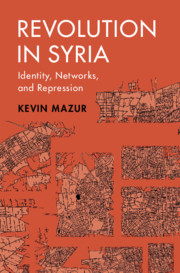Book contents
- Revolution in Syria
- Cambridge Studies in Comparative Politics
- Revolution in Syria
- Copyright page
- Dedication
- Contents
- Figures
- Tables
- Acknowledgments
- A Note on Transliteration
- 1 Introduction
- 2 Theory
- 3 Networks, Identities, and Patronage in Contemporary Syria
- 4 Events of the Syrian Uprising
- 5 Initial Forms of Challenge
- 6 State Networks and Nonparticipation
- 7 Logics of State Repression and Societal Response
- 8 Particularizing Challenge in Kurdish Areas
- 9 Conclusion
- Appendix
- Chronology of Major Events in the First Year of the 2011 Syrian Uprising
- References
- Index
- Series page
2 - Theory
Published online by Cambridge University Press: 18 June 2021
- Revolution in Syria
- Cambridge Studies in Comparative Politics
- Revolution in Syria
- Copyright page
- Dedication
- Contents
- Figures
- Tables
- Acknowledgments
- A Note on Transliteration
- 1 Introduction
- 2 Theory
- 3 Networks, Identities, and Patronage in Contemporary Syria
- 4 Events of the Syrian Uprising
- 5 Initial Forms of Challenge
- 6 State Networks and Nonparticipation
- 7 Logics of State Repression and Societal Response
- 8 Particularizing Challenge in Kurdish Areas
- 9 Conclusion
- Appendix
- Chronology of Major Events in the First Year of the 2011 Syrian Uprising
- References
- Index
- Series page
Summary
This chapter sets out the book’s main theoretical claims. It argues that understanding the emergence of revolutionary challenge along ethnic lines requires a focus on local-level interactions between social actors and state agents and how they vary over time. This approach directs attention to variation within ethnic groups and, specifically, to linkages between sub-ethnic units and the state. The chapter then presents the book’s main theoretical intervention: state linkages often condition the participation of “ethnically excluded” populations, and incumbent response to challenge is often not focused singly on dividing the population on ethnic lines but includes important forms of conciliation aimed at preserving cross-ethnic clients. This conciliation often fails, however, because informal, ethnically dominated autocratic regimes resort to violence to deal with immediate threats posed by prolonged urban demonstrations and challenger violence, shattering many of the linkages forged across ethnic lines. This view of challenger–incumbent interaction under ethnically dominated rule challenges the dominant view that regimes intentionally polarize their polities on ethnic lines to cling to power; the patchwork of bargains such regimes strike with various elements of the populations they rule can channel contention toward ethnic violence, even when ethnicization is not in the incumbent’s interest.
Keywords
- Type
- Chapter
- Information
- Revolution in SyriaIdentity, Networks, and Repression, pp. 23 - 59Publisher: Cambridge University PressPrint publication year: 2021

